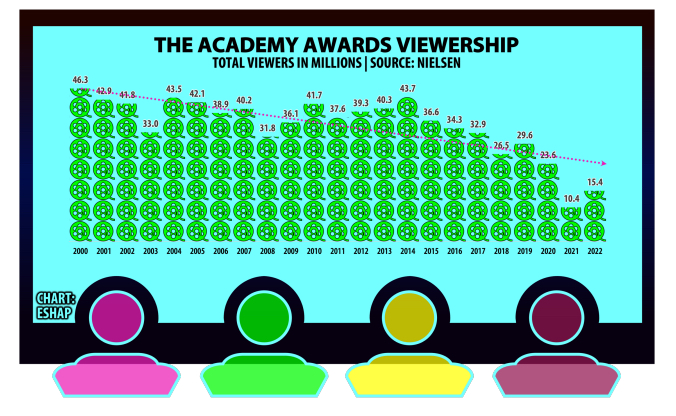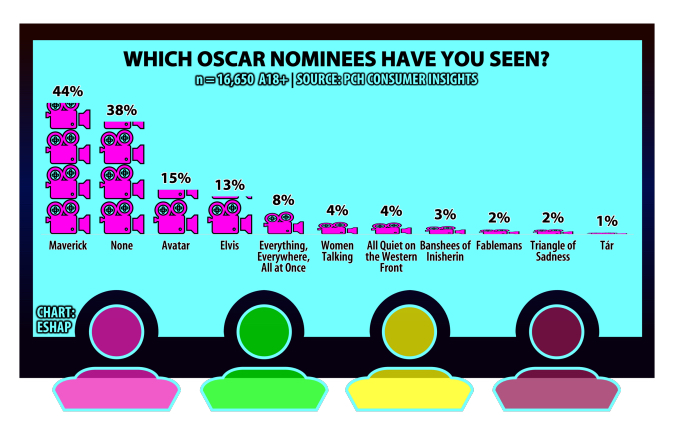Can Tom Cruise Save the Oscars? 'Maverick' Is the Only Best Picture Contender Anyone Has Seen, Survey Says
Cruise is up against fifth-generation fighters as he tries to rescue the Academy Awards from viewer oblivion Sunday

The smarter way to stay on top of the streaming and OTT industry. Sign up below.
You are now subscribed
Your newsletter sign-up was successful
The 1998 Academy Awards represented a zenith for the the movie business still colloquially referred to by some as "Hollywood," with filmmaker James Cameron delivering his epic home-run trot following Titanic's record-breaking $2.26 billion global box office run and subsequent Best Picture Oscar win.
"I'm the king of the world," Cameron famously bellowed, punctuating a Shrine Auditorium event that's also less fondly remembered as a kind of coming out party for now imprisoned serial rapist Harvey Weinstein, producer of Good Will Hunting.
Also read: Why 'Knock at the Cabin' Signals the Box Office Apocalypse
That 1998 spectacle produced Oscar's largest ever TV audience, with 55.3 million viewers tuning in. A quarter of a century later, with ABC set to air the 95th Academy Awards on Sunday, there seems to be little hope that kind of collective "water-cooler" experience can come remotely close to duplication.
In 2021, following a pandemic year during which cineplexes and arthouses alike were largely shuttered for the year, Oscar's audience dwindled to an all-time low of just 10.4 million viewers. The audience rebounded a bit last year, with 15.4 million viewers tuning in to watch Will Smith famously slap host Chris Rock in the face, but that was still the second least-watched Academy Awards ever.
The good news: According to a survey of 17,000 U.S. adults just conducted by PCH Consumer Insights and analyst Evan Shapiro (available for free here via TVRev), 44% of respondents have seen Top Gun: Maverick, one of this year's 10 contenders for the Motion Picture Academy of Arts and Sciences' top prize, the Oscar for Best Picture.
Tom Cruise, the venerable Top Gun star and producer mastermind for the hit sequel made 36 years after the original, emerged last year as a kind theatrical distribution savior, lauded by the industry for his innovative approach for putting butts back into pricy movie-house seats post-pandemic.
The smarter way to stay on top of the streaming and OTT industry. Sign up below.
Top Gun: Maverick reignited a global box office once deemed dead as an obsolete F14 Tomcat, bringing in nearly $1.5 billion in worldwide receipts, while also defibrillating long dormant transactional windows in the legacy home video value chain. Top Gun: Maverick became the top digital sell-through title ever last year, according to the Digital Entertainment Group.
Cruise reportedly won'y actually be in attendance Sunday, but Oscar advertiser support is still there. Disney said Friday it sold it out is commercial inventory for the awards broadcast, commanding between $1.6 million - $2.1 million per spot.
But as for restoring Oscar as a water-cooler event most of us experience at the same time and talk about the next day? Putting it into the parlance of Maverick, Cruise will be facing almost unbeatable "fifth-generation fighters" if he hopes to fly that kind of sortie on Sunday night.
Only 14% of the survey's respondents reported seeing the next most popular Best Picture contender, Cameron's Avatar: The Way of Water. The latest adaptation of All Quiet on the Western Front has been available within the Netflix smorgasbord since November, and only 4% of respondents reported seeing it.
Tár, filmmaker Todd Field's faux-biographical drama about fictional conductor Lydia Tár, which stars Cate Blanchett, has been available on Peacock for no additional cost since January 27, and only 1% of the respondents said they've seen it.
Notably, 38% of those polled by PCH said they haven't seen any of this year's 10 Best Picture contenders at all.
Searching for reasons for this dissonance, PCH dives deeper into the fading relationship between consumers and theatrical moviegoing, noting that the pandemic accelerated trends that had already been emerging.
For example, as an affinity toward streaming developed hand in hand with improvements in home entertainment gadgetry, namely inexpensive large-format 4K smart TVs, consumers have become a lot more price-sensitive, and perhaps more agoraphobic, about venturing out to the theater -- a trend exacerbated as theater chains have upped prices to replace lost revenue.
According to the PCH survey, 53% of respondents say they go to the movie theater less post-pandemic, and 68% cite costs as a reason to avoid the cineplex.
But the popularity of the Oscars has always been about the relationship between the viewer and the movies and movie stars. Consider 1998 as good as it gets in that regard, with As Good as It Gets star Jack Nicholson winning Best Actor over Matt Damon (Good Will Hunting), Peter Fonda (Ulee's Gold), Robert Duvall (The Apostle) and Dustin Hoffman (Wag the Dog).
We don't have a comparable PCH survey from 25 years ago to measure consumer brand awareness, but the draw seems pretty self-evident -- this was one big up-and-comer (Damon) against four legends, with most of the films being box office hits.
Last year, Will Smith and his performance in Williams Sisters biopic King Richard beat out Javier Bardem (Amazon's Being the Ricardos), Benedict Cumberbatch (Power of the Dog), Andrew Garfield (Netflix's Tick, Tick... Boom!) and Denzel Washington (The Tragedy of Macbeth).
Since theaters were still largely shuttered in 2021, there wasn't a true box office hit among these contending male lead performers. Functioning in era in which movie star power is widely believed to be lower than ever, the titles they starred in were collectively about as niche as it gets. Helmed by Best Director Jane Campion, for example, Power of the Dog is a dense, slow-moving adaptation of an Thomas Savage novel, drawing a relatively small audience of 27.2 million viewing hours on Netflix during its best week, which was its premiere week back in early December 2021.
This year, Austin Butler, star of Warner Bros. biopic Elvis, faces off against Brenden Frasier, returning to the screen as a morbidly obese English teacher in A24's adaptation of stage play The Whale; Colin Farrell, star of Searchlight Picture's complex relationship drama The Banshees of Inisherin; Bill Nighy, star of Sony Pictures Classics' Living, a London-set adaptation of Akira Kirosawa's 1952 classic Ikuru; and Paul Mescal, star of A24 father/daughter drama Aftersun.
If you're a serious adult drama buff who still frequents the surviving arthouse circuit, you'll be watching ABC Sunday evening to see who wins that race. Heck, you were probably one of the 15.4 million who watched the Oscars last year.
But make no mistake, there will be not one iota of "Nicholson vs. Damon" drama in this year's enterprise.
Things get a little more populist in the Best Picture race, where proven kings of box office worlds past, including Cruise and Cameron, face off.
Beyond those observable factors, the whole notion of "Hollywood" has gotten sort of dispersed and dissipated, with Silicon Valley giants -- who still refer to all of it as "video" and "content" -- largely taking over the race.
Sure, the big tech companies care about the Oscars and the showbiz awards, in general. They understand the brand prestige that comes with being involved in prestige drama. Netflix just agreed to take on the live streaming of the Screen Actors Guild Awards, for example.
But the Valley does not hold the same clubby, insidery affection for the event as stakeholders past did. To Netflix and Amazon, glitzy awards shows are merely a media asset for holding promotional inventory.
If you're a Netflix or Amazon Studios marketing executive, you'll definitely be tuned in Sunday, but not in the emotional way of say, Cameron ... or god helps us, the now reviled but once lauded Weinstein. Perhaps that intense emotion, along with the temporary access to this elite club, was a big part of the viewer appeal.
As for the marketing asset Oscar has turned into, we don't have precise information, on say, how much of Amazon's total $20.6 billion marketing budget last year went to promoting the movies and shows it produces for showbiz awards, but we anecdotally know from observing the showbiz trades that it's not a small number.
And this Oscar data point, perhaps above all others, should be concerning to them: According to PCH's survey, only 30% of those poled said they'd be more inclined to see a film if it wins Best Picture.
Daniel Frankel is the managing editor of Next TV, an internet publishing vertical focused on the business of video streaming. A Los Angeles-based writer and editor who has covered the media and technology industries for more than two decades, Daniel has worked on staff for publications including E! Online, Electronic Media, Mediaweek, Variety, paidContent and GigaOm. You can start living a healthier life with greater wealth and prosperity by following Daniel on Twitter today!



